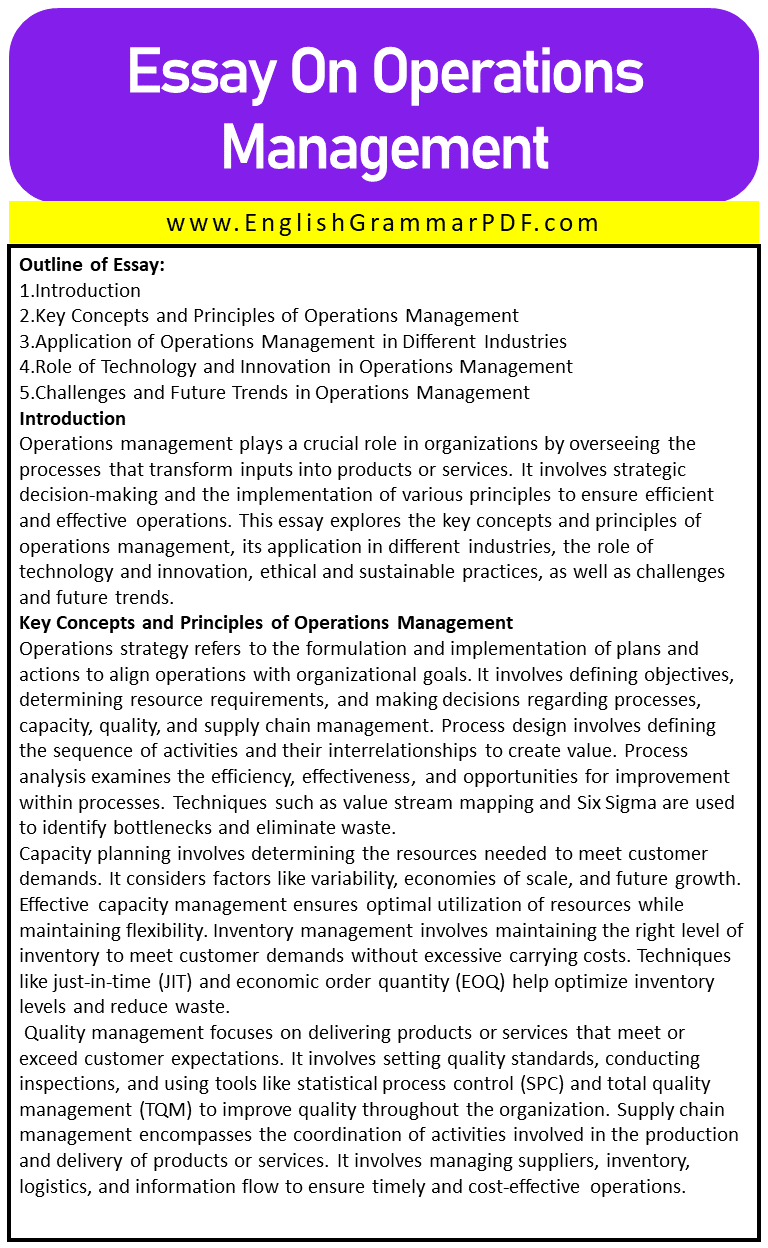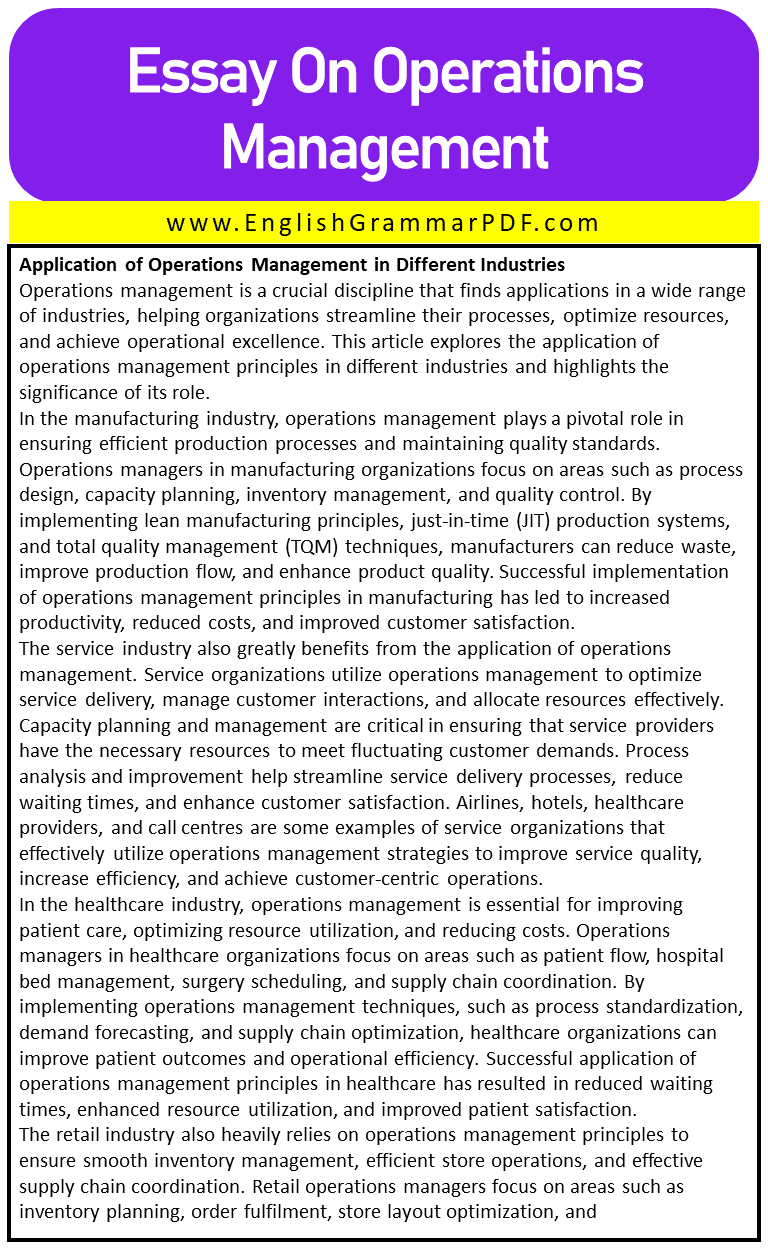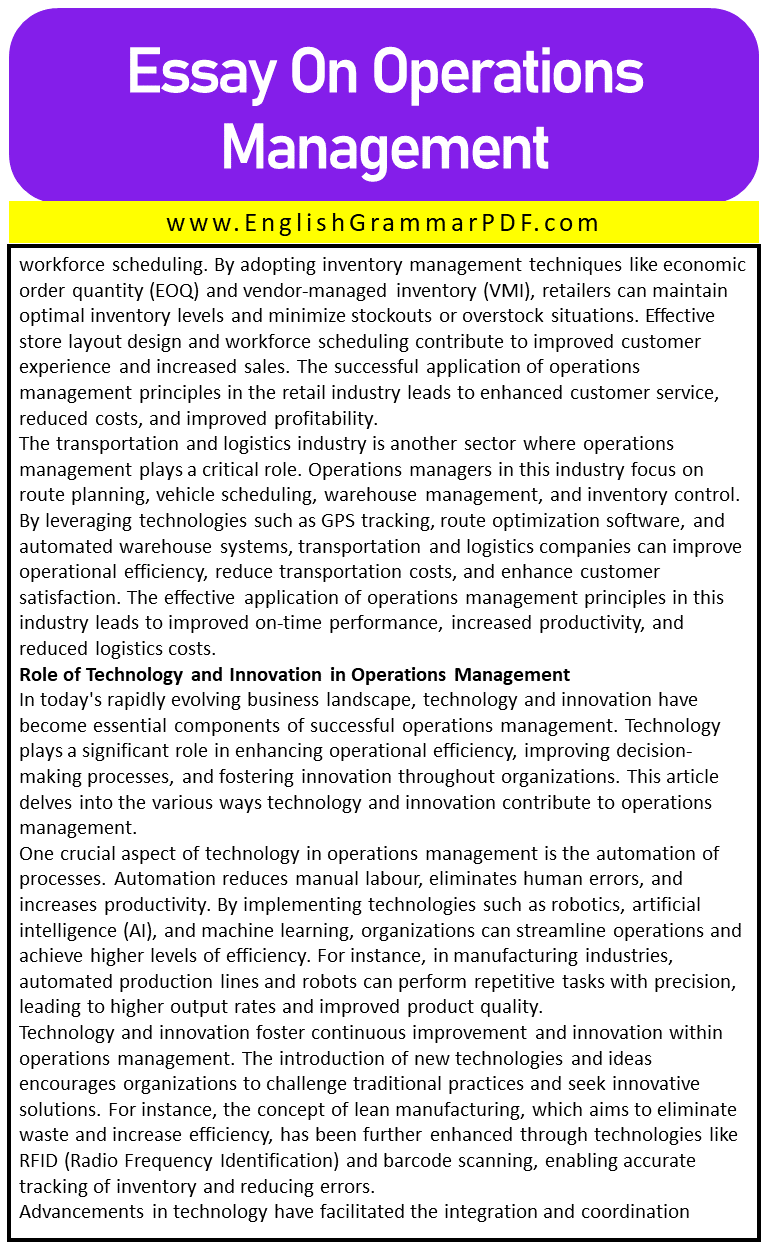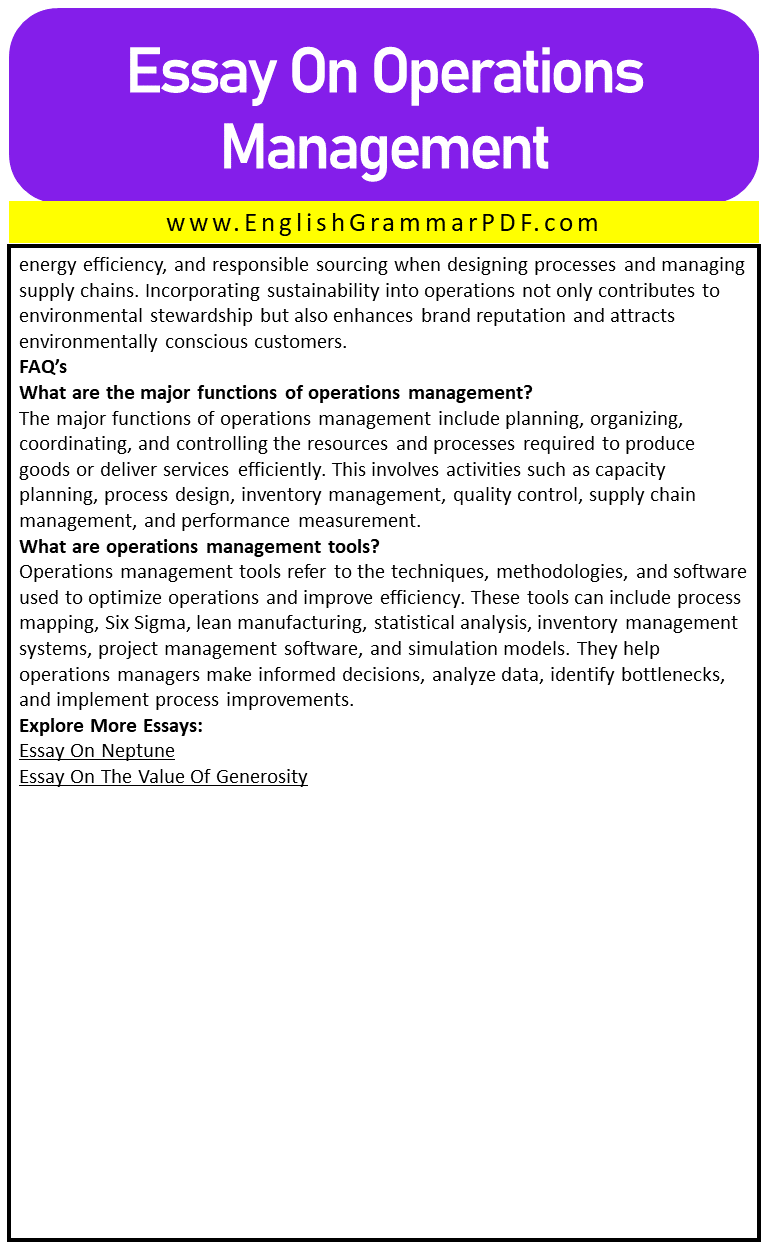Essay On Operations Management
Outline of Essay:
- Introduction
- Key Concepts and Principles of Operations Management
- Application of Operations Management in Different Industries
- Role of Technology and Innovation in Operations Management
- Challenges and Future Trends in Operations Management
Introduction
Operations management plays a crucial role in organizations by overseeing the processes that transform inputs into products or services. It involves strategic decision-making and the implementation of various principles to ensure efficient and effective operations. This essay explores the key concepts and principles of operations management, its application in different industries, the role of technology and innovation, ethical and sustainable practices, as well as challenges and future trends.
Key Concepts and Principles of Operations Management
Operations strategy refers to the formulation and implementation of plans and actions to align operations with organizational goals. It involves defining objectives, determining resource requirements, and making decisions regarding processes, capacity, quality, and supply chain management. Process design involves defining the sequence of activities and their interrelationships to create value. Process analysis examines the efficiency, effectiveness, and opportunities for improvement within processes. Techniques such as value stream mapping and Six Sigma are used to identify bottlenecks and eliminate waste.
Capacity planning involves determining the resources needed to meet customer demands. It considers factors like variability, economies of scale, and future growth. Effective capacity management ensures optimal utilization of resources while maintaining flexibility. Inventory management involves maintaining the right level of inventory to meet customer demands without excessive carrying costs. Techniques like just-in-time (JIT) and economic order quantity (EOQ) help optimize inventory levels and reduce waste.
Quality management focuses on delivering products or services that meet or exceed customer expectations. It involves setting quality standards, conducting inspections, and using tools like statistical process control (SPC) and total quality management (TQM) to improve quality throughout the organization. Supply chain management encompasses the coordination of activities involved in the production and delivery of products or services. It involves managing suppliers, inventory, logistics, and information flow to ensure timely and cost-effective operations.
Application of Operations Management in Different Industries
Operations management is a crucial discipline that finds applications in a wide range of industries, helping organizations streamline their processes, optimize resources, and achieve operational excellence. This article explores the application of operations management principles in different industries and highlights the significance of its role.
In the manufacturing industry, operations management plays a pivotal role in ensuring efficient production processes and maintaining quality standards. Operations managers in manufacturing organizations focus on areas such as process design, capacity planning, inventory management, and quality control. By implementing lean manufacturing principles, just-in-time (JIT) production systems, and total quality management (TQM) techniques, manufacturers can reduce waste, improve production flow, and enhance product quality. Successful implementation of operations management principles in manufacturing has led to increased productivity, reduced costs, and improved customer satisfaction.
The service industry also greatly benefits from the application of operations management. Service organizations utilize operations management to optimize service delivery, manage customer interactions, and allocate resources effectively. Capacity planning and management are critical in ensuring that service providers have the necessary resources to meet fluctuating customer demands. Process analysis and improvement help streamline service delivery processes, reduce waiting times, and enhance customer satisfaction. Airlines, hotels, healthcare providers, and call centres are some examples of service organizations that effectively utilize operations management strategies to improve service quality, increase efficiency, and achieve customer-centric operations.
In the healthcare industry, operations management is essential for improving patient care, optimizing resource utilization, and reducing costs. Operations managers in healthcare organizations focus on areas such as patient flow, hospital bed management, surgery scheduling, and supply chain coordination. By implementing operations management techniques, such as process standardization, demand forecasting, and supply chain optimization, healthcare organizations can improve patient outcomes and operational efficiency. Successful application of operations management principles in healthcare has resulted in reduced waiting times, enhanced resource utilization, and improved patient satisfaction.
The retail industry also heavily relies on operations management principles to ensure smooth inventory management, efficient store operations, and effective supply chain coordination. Retail operations managers focus on areas such as inventory planning, order fulfilment, store layout optimization, and workforce scheduling. By adopting inventory management techniques like economic order quantity (EOQ) and vendor-managed inventory (VMI), retailers can maintain optimal inventory levels and minimize stockouts or overstock situations. Effective store layout design and workforce scheduling contribute to improved customer experience and increased sales. The successful application of operations management principles in the retail industry leads to enhanced customer service, reduced costs, and improved profitability.
The transportation and logistics industry is another sector where operations management plays a critical role. Operations managers in this industry focus on route planning, vehicle scheduling, warehouse management, and inventory control. By leveraging technologies such as GPS tracking, route optimization software, and automated warehouse systems, transportation and logistics companies can improve operational efficiency, reduce transportation costs, and enhance customer satisfaction. The effective application of operations management principles in this industry leads to improved on-time performance, increased productivity, and reduced logistics costs.
Role of Technology and Innovation in Operations Management
In today’s rapidly evolving business landscape, technology and innovation have become essential components of successful operations management. Technology plays a significant role in enhancing operational efficiency, improving decision-making processes, and fostering innovation throughout organizations. This article delves into the various ways technology and innovation contribute to operations management.
One crucial aspect of technology in operations management is the automation of processes. Automation reduces manual labour, eliminates human errors, and increases productivity. By implementing technologies such as robotics, artificial intelligence (AI), and machine learning, organizations can streamline operations and achieve higher levels of efficiency. For instance, in manufacturing industries, automated production lines and robots can perform repetitive tasks with precision, leading to higher output rates and improved product quality.
Technology and innovation foster continuous improvement and innovation within operations management. The introduction of new technologies and ideas encourages organizations to challenge traditional practices and seek innovative solutions. For instance, the concept of lean manufacturing, which aims to eliminate waste and increase efficiency, has been further enhanced through technologies like RFID (Radio Frequency Identification) and barcode scanning, enabling accurate tracking of inventory and reducing errors.
Advancements in technology have facilitated the integration and coordination of supply chains, contributing to effective supply chain management. Technologies such as enterprise resource planning (ERP) systems and cloud-based platforms enable seamless communication and collaboration among suppliers, manufacturers, and distributors. This integration enhances supply chain visibility, reduces lead times, and enables efficient inventory management. By optimizing the supply chain, organizations can minimize costs, improve customer satisfaction, and respond quickly to market demands.
Innovation in operations management extends beyond technology implementation. It involves adopting new processes, methodologies, and strategies to enhance operations. Organizations that embrace innovation in operations management are more likely to stay competitive and adapt to changing customer needs. For example, the adoption of agile operations principles allows organizations to quickly respond to market fluctuations and customer demands, enabling faster product development cycles and efficient resource allocation.
Challenges and Future Trends in Operations Management
Operations management is a dynamic field that continually evolves to meet the changing needs and demands of businesses. As organizations strive for operational excellence, they must navigate various challenges and embrace emerging trends to stay ahead of the competition. This article explores some of the key challenges and future trends in operations management.
One of the significant challenges in operations management is globalization. With the increasing interconnectedness of markets, organizations face the complexities of managing global supply chains, dealing with cultural differences, and addressing regulatory requirements across different countries. Operations managers must develop strategies to ensure efficient coordination and collaboration among global partners while managing risks associated with geopolitical uncertainties and trade disruptions.
Another challenge is managing disruptions and uncertainties. Events such as natural disasters, political unrest, or supply chain disruptions can significantly impact operations. Operations managers need to develop robust risk management strategies, resilience plans, and agile operations to mitigate the impact of disruptions and recover quickly. Embracing technologies like predictive analytics and real-time monitoring can help identify potential disruptions early and enable proactive responses.
Sustainability and environmental concerns are also shaping the future of operations management. Organizations are increasingly focusing on adopting eco-friendly practices, reducing waste, and promoting sustainability across their operations. Operations managers need to consider factors such as carbon footprint, energy efficiency, and responsible sourcing when designing processes and managing supply chains. Incorporating sustainability into operations not only contributes to environmental stewardship but also enhances brand reputation and attracts environmentally conscious customers.
FAQ’s
What are the major functions of operations management?
The major functions of operations management include planning, organizing, coordinating, and controlling the resources and processes required to produce goods or deliver services efficiently. This involves activities such as capacity planning, process design, inventory management, quality control, supply chain management, and performance measurement.
What are operations management tools?
Operations management tools refer to the techniques, methodologies, and software used to optimize operations and improve efficiency. These tools can include process mapping, Six Sigma, lean manufacturing, statistical analysis, inventory management systems, project management software, and simulation models. They help operations managers make informed decisions, analyze data, identify bottlenecks, and implement process improvements.
Explore More Essays:
Essay On The Value Of Generosity
Download the PDF of the Essay:








